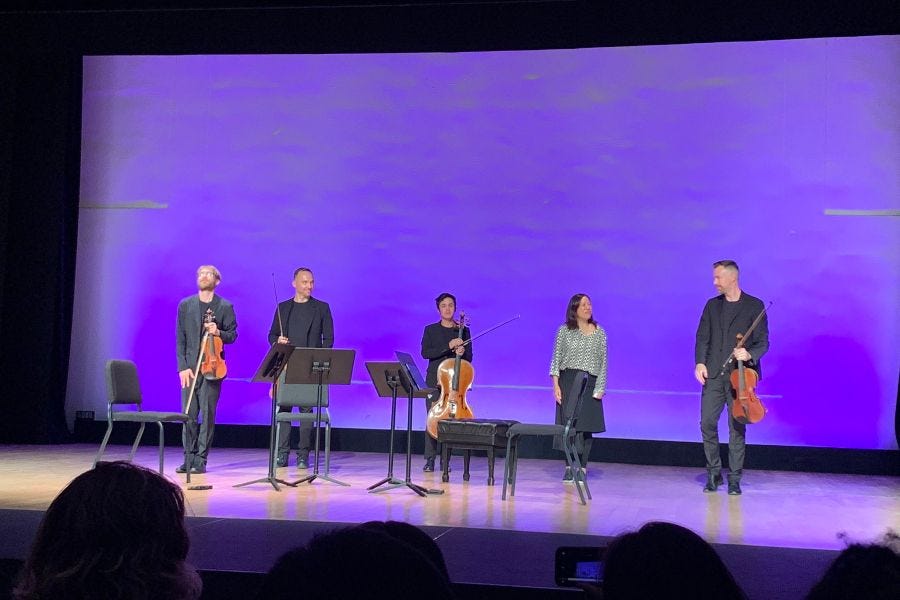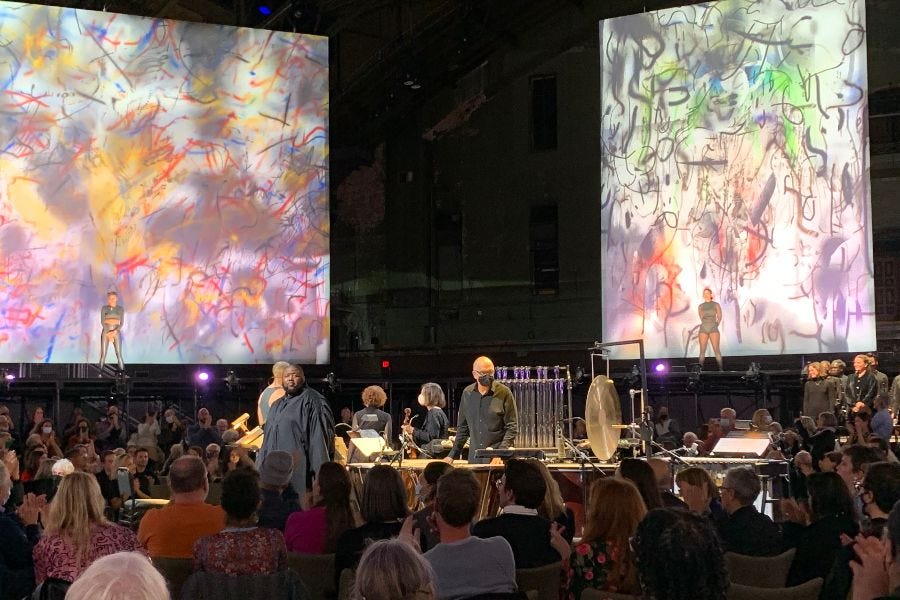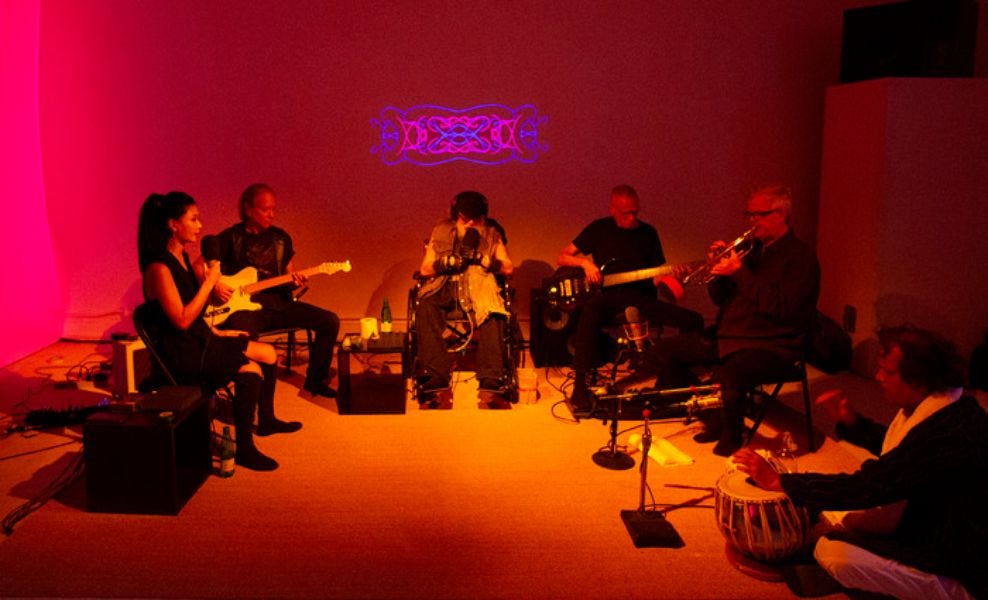And away we go.
Briefs from a new-music season now underway… plus loads of news and a big stack of recommended gigs.
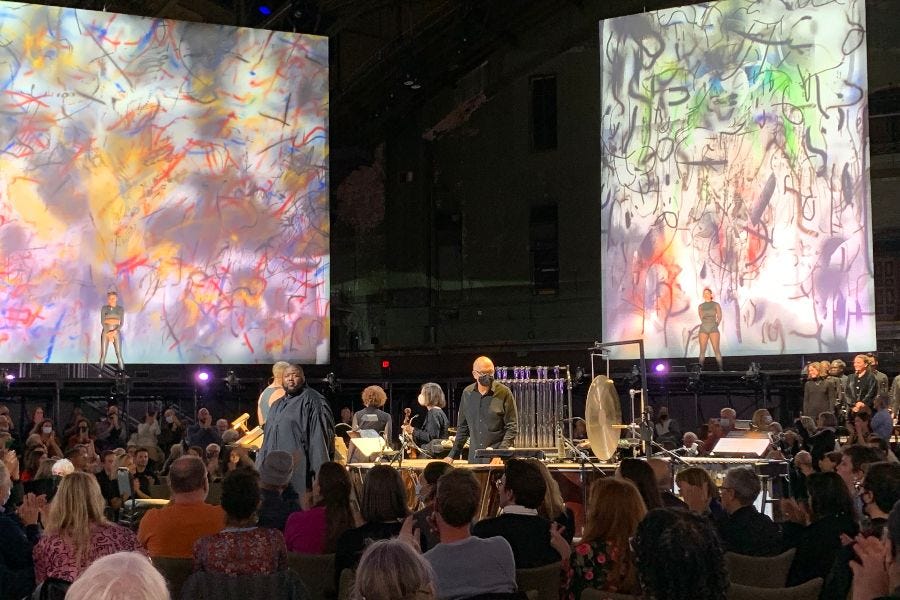
Prelude.
The new concert-music season has finally begun, and I'm grateful to have attended two excellent programs. Both featured composers and performers whose work I esteem and follow closely, and I attended both in excellent company, always a privilege.
But before I dive headlong into details, I'd like to take just a moment to express my gratitude to Anna Heflin – composer, media professional, and owner and co-editor of the always worth reading Which Sinfonia – whose words of generosity and encouragement came at a moment that made a difference.
Miller Theatre at Columbia University opened its fall season on Sept. 29 with a Composer Portrait concert devoted to music by Liza Lim, performed by the musicians of JACK Quartet. I say "the musicians of" chiefly because the first piece, an ocean beyond earth, was a solo work for cello attached by thread to a violin on a stand, an elemental assemblage played with poetry and grit by JACK Quartet cellist Jay Campbell. (An ideally illustrative photograph by Rob Davidson appeared with a review of the concert by Seth Colter Walls in The New York Times, and you can watch a video of cellist Séverine Ballon playing the piece on YouTube.)
My relationship with Miller Theatre and its artistic leadership has been long and close, and I've written a great deal in the past about the venue and its doings. Recently, though, my coverage has been limited to a handful of listings and not much more, and that's partly because the journalist and scholar who's been providing the venue's consistently excellent program notes is someone to whom I'm happily married, and, well, ethics matter. Full disclosure is vital, and a pleasure, but I hesitate to say too much otherwise.
Still, as I mentioned already on Twitter immediately following the concert: Lim's new quartet String Creatures – commissioned jointly by Miller Theatre, Lucerne Festival, and Melbourne Recital Centre – is not just an exceptional piece, but in my view one of the finest things JACK has done. That's based on a single encounter, of course, but I'm confident my opinion will hold.
There's no question that when we reach the end of the year, Monochromatic Light (Afterlife) will be among those indelible experiences still discussed with intensity by those who experienced it. The music, by Tyshawn Sorey, was spacious and precious – and for all that his assignment by design took strong cues from Morton Feldman's Rothko Chapel, what struck me throughout the work's hour-plus duration was how obviously and utterly dissimilar Sorey's piece was from Rothko Chapel or any other Feldman composition. (So much for the commenters on the New York Times website who dismissed the piece unheard for "imitation.")
The presentation director Peter Sellars devised within the cavernous blank-slate space provided by Park Avenue Armory suited the piece magnificently: an ensemble encircled by its audience, which in turn was surrounded by luminous projected Julie Mehretu paintings that radiated a spirit wholly distinct from Rothko's meditative darkness.
Before and occasionally behind each screen, Reggie "Regg Roc" Gray's dancers embodied symphonies of sinew, muscle, and bone. The Choir of Trinity Wall Street intoned mottled, bruised harmonic clouds, through and around which the bass-baritone Davóne Tines threaded tatters from a familiar spiritual, in a manner that could sound desperate or determined by turns.
What Sorey's music and the surrounding assemblage seemed to share most closely with the Rothko Chapel, and with the Feldman piece of that name, was a demarcation of non-denominational sacred space: a place into which all who enter are compelled to contemplate not only what they encounter, but also what they brought along inside themselves.
The term that comes to mind, in all of its various nuances, is sublime.
Here is the news.
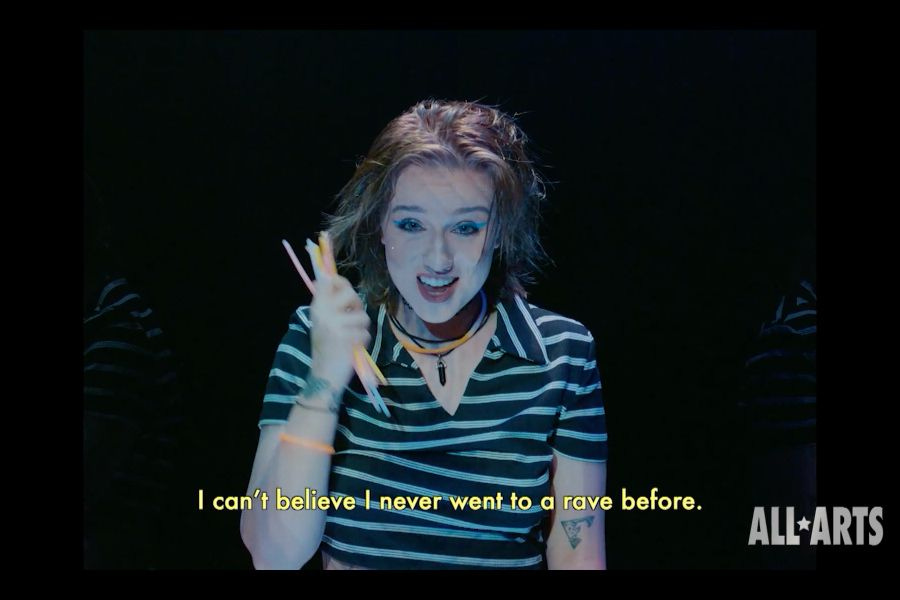
• Robert Ashley proposed television as a viable platform for opera with his pioneering video opera Perfect Lives more than 40 years ago, but the notion didn't really take hold and become established until the coronavirus pandemic left little other choice. Opera Philadelphia produced a marvelous series of original short works like The Island We Made; Boston Lyric Opera followed with desert in, a video-opera series featuring disparate pairings of composers and librettists working in a TV-style writers' room situation.
Now, the adventurous New York company Experiments in Opera – which this season celebrates its 10th anniversary – is mounting its own new serial creation, Everything for Dawn, a 10-episode series of 15-minute operas streaming free of charge on All Arts, a video channel and streaming platform operated by New York PBS affiliate WNET. The first two episodes were posted on Oct. 7; two more episodes will be added every Friday.
The series involves 10 composers – including EIO leaders Jason Cady, Kamala Sankaram, and Aaron Siegel – plus six writers working collaboratively on a serialized libretto. The episodes are directed by Alison Moritz, with Eric Thomas Paton as director of photography. Music director David Bloom leads a small ensemble of new-music mainstays on strings, piano, and percussion.
The story concern a young woman growing up in the mid to late '90s and early aughts, coming to terms with her father's suicide and subsequent "discovery" as an outsider artist. An interview with Cady and Siegel on the All Arts site tells more of the story behind the work and its assembly—but there's no reason why you shouldn't simply dive right in, here.
• Luna Composition Lab is accepting applications for its respected fellowship program, and for the beginning composition class, Adventures in Sound. The program, founded by Missy Mazzoli and Ellen Reid in 2016, provides invaluable mentorship, education, and resources for young female, nonbinary, and gender-nonconforming composers ages 13 through 18. Applications are due on Saturday, Oct. 15; more here.
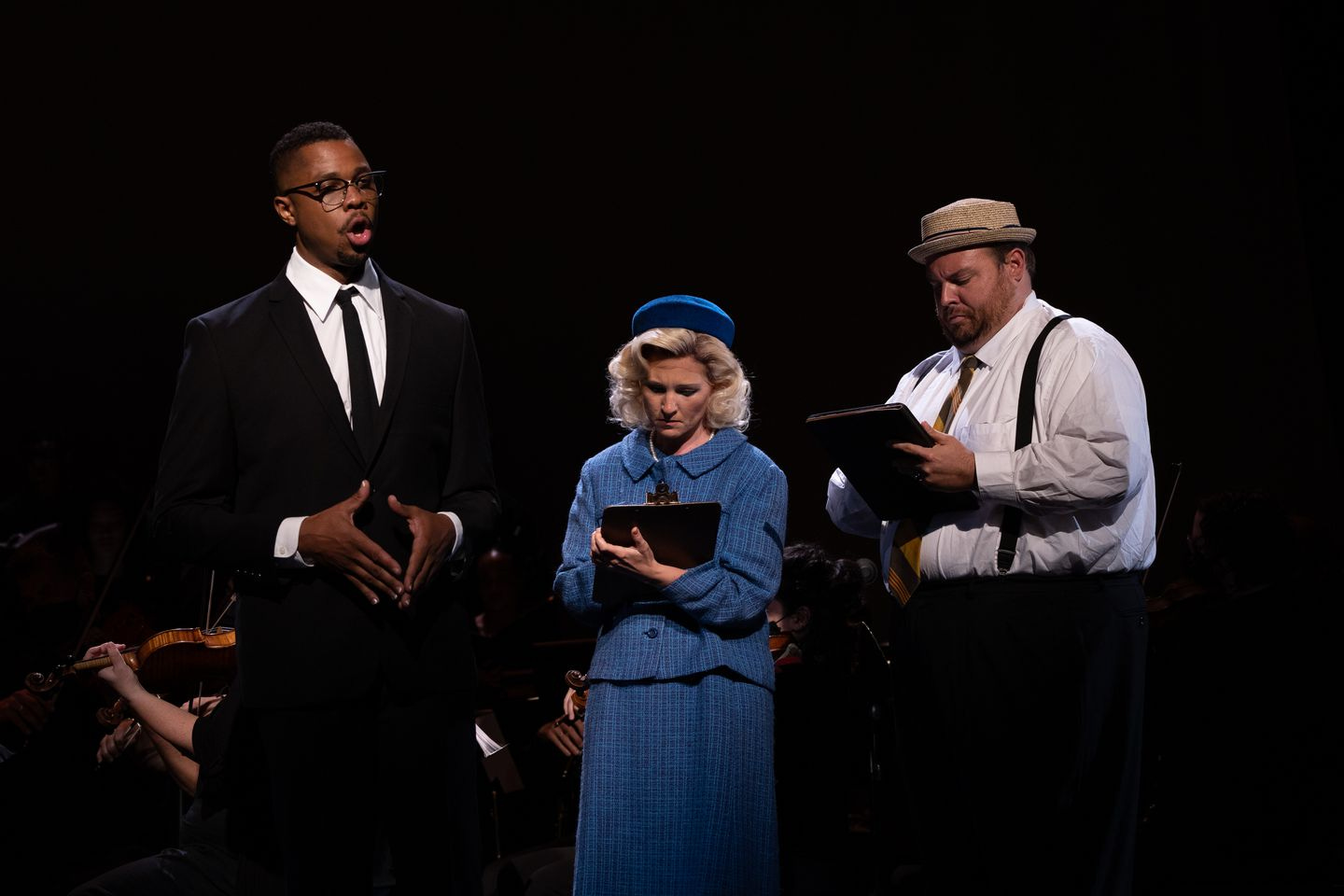
• Last week, Boston Modern Opera Project released its new recording of X: The Life and Times of Malcolm X, the first opera by Anthony Davis, in what's billed as the premiere recording of a revised version. When BMOP and Odyssey Opera jointly performed X in Dorchester over the summer with Davóne Tines in the title role, Jeremy Eichler wrote approvingly in the Boston Globe:
The result, in its best moments, can be a new dimensionality for both past and present — and even something of a correction. In an editorial after his death, The New York Times described Malcolm X’s life as “strangely and pitifully wasted.” Yet the entire Black Lives Matter movement, as the scholar Ibram X. Kendi and many others have pointed out, is indebted to his legacy. This particular opera helps an amnesiac culture understand why. And it does so by implicitly linking contemporary struggles with a much older story of reaching for that distant light.
Now that the recording is out, Castle of Our Skins, Boston's indispensable Black arts institution, has joined forces with BMOP to offer free of charge a curriculum guide to the opera for teachers interested in sharing the piece with their students. What's more, educators who order the guide by Dec. 31 will receive a special code for a free CD or download copy of the BMOP recording via Bandcamp. Now that's an enlightened project. (Sincere thanks to the tireless advocates Larry and Arlene Dunn for bringing this deal to my attention.)
• After 20 seasons of concerts, the groundbreaking new-music and visual art festival Look + Listen has announced that it will cease operation this month. A free farewell concert is set to happen on Friday, Oct. 28 at the Invisible Dog Arts Center in Brooklyn; RSVP here.
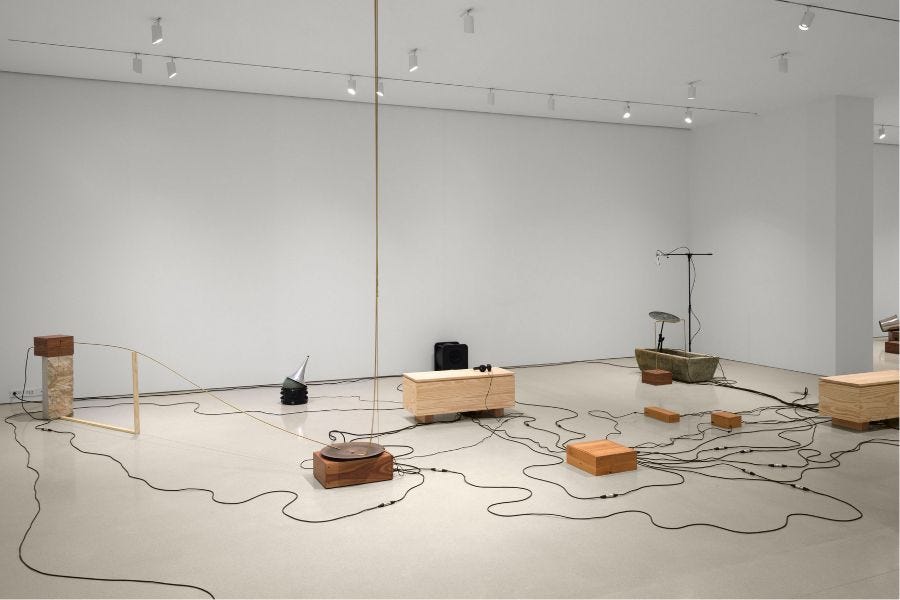
• Now on view at The FLAG Art Foundation (545 W. 25th St., on the ninth floor of the Chelsea Arts Tower), Tarek Atoui: The Whisperers features works by Tarek Atoui, a Paris-based Lebanese artist and composer. Winner of the 2022 Suzanne Deal Booth/FLAG Art Foundation Prize. Atoui explores the nature of sound, along with the implements and methods of its production. This exhibition, previously shown at The Contemporary in Austin, TX, emerged from a series of exploratory workshops Atoui conceived for his son's Kindergarten class in Paris during pandemic.
“These sessions brought me back to the basics of my practice and made me reconsider elementary things: how I work with speakers, how I work with microphones, with rotation and turntables and records, with sound in air, sound in water, sound in metal, etc.,” Atoui said in a statement on the FLAG website.
On view through Dec. 10, The Whisperers will double as a site for interactive live performances featuring Jad Atoui – Tarek's brother, and a Beirut-based sound artist and improviser who's got his own residency Oct. 12-15 at The Stone at The New School – plus Susie Ibarra and Robert Aiki Aubrey Lowe. (As yet I've uncovered no dates; keep an eye on the FLAG website.)
• Writing for The Guardian, Liz Pelly documents a wave of listeners and music makers who are ditching streaming services, less for the customary ethical/financial reasons than in an effort to reassess their fundamental relationships with consumption and appreciation. As improvising guitarist, composer, bandleader, and singer-songwriter Wendy Eisenberg put it:
“Taking the extra step to load it on to my phone, or the extra step to flip over the tape, or put the CD on in the car, it feels like something that I’m doing, rather than something I’m receiving. And that sense of agency makes me a more dedicated and involved listener than the kind of passive listening-without-listening that streaming was making me do.”
Read the article here.
• In preparing a tidy little Can primer for the music recommendation site Shfl, Sasha Frere-Jones interviewed band co-founder Irmin Schmidt… and then shared the entire Q&A in his own newsletter, which I continue to recommend heartily in spite of the platform.
• Finally, The New York Times has published a deeply probing and starkly illuminating obituary for drummer, composer, and bandleader Anton Fier. I'll divulge no specifics, save to say that writer Alex Williams gathered all the details needed to make this a terribly, terribly difficult read, but one of vital importance… and not just for those who knew and loved and/or admired Fier and his work.
Playlist.
The latest tally of memorable things that got stuck in my ears includes recent and upcoming releases featuring Goose, Lorraine James, Anthony Davis, Lucy Fitz Gibbon & Ryan MacEvoy McCullough, and plenty more.
Hear, here.
Night After Night Watch.
Concerts listed in Eastern Standard Time.
Jennifer Koh & Davóne Tines: Everything Rises
BAM Fisher, Brooklyn Academy of Music
321 Ashland Place, Brooklyn
Wednesday, Oct. 12–Saturday, Oct. 15 at 7:30pm; $35
bam.org
Violinist Jennifer Koh and bass-baritone Davóne Tines, two of the boldest, most uncompromising activist artists presently working in the concert-music sphere, come together in a new evening-length piece composed by Ken Ueno, meant to illuminate how they've navigated the predominantly white world of classical music and its leading institutions.
New York Philharmonic
David Geffen Hall, Lincoln Center
10 Lincoln Center Plaza, Midtown Manhattan
Wednesday, Oct. 12–Tuesday, Oct. 18, times vary; $53–$172
nyphil.org
Jaap van Zweden and the New York Philharmonic open their new season at David Geffen Hall with a world premiere meant to demonstrate the refurbished venue's mettle: Oyá, by Marcos Balter, with Levy Lorenzo on electronics and Nicholas Houfek on lighting. The program also includes Tania León's Pulitzer Prize-winning Stride, John Adams's evocative My Father Knew Charles Ives, and Ottorino Respighi's grandiose Pines of Rome.
TILT Brass + Zeena Parkins
Pioneer Works
150 Pioneer St., Red Hook
Wednesday, Oct. 12 at 8pm; $25, advance $20
pioneerworks.org
For the twelfth installment of the False Harmonics series, TILT Brass presents Julius Eastman's If You’re So Smart, Why Aren’t You Rich? in a new arrangement by TILT leader and trombonist Chris McIntyre, plus compositions by Zeena Parkins and Phill Niblock. Parkins, in addition to playing with TILT, offers a solo set including a piece of her own and another by John Bischoff.
Tim Berne, Gregg Belisle-Chi, and Jim Black
Lowlands Bar
543 3rd Ave., Gowanus
Thursday, Oct. 13 at 8pm; price unknown
lowlandsbar.com
Fresh off a fistful of European gigs, saxophonist, composer, and bandleader Tim Berne hits one of his current favorite local hangs with a longtime collaborator, Jim Black, on drums, and a newer sparring partner, Gregg Belisle-Chi, on guitar.
Nico Muhly & Alice Goodman: The Street
Church of the Intercession
550 W. 155th St., Harlem
Friday, Oct. 14 at 6:30 & 8pm; $85
deathofclassical.com
Harpist Parker Ramsay, soprano Hannah Spierman, and speaker Monica Wyche present the New York premiere of The Street, a splendid work by composer Nico Muhly and poet/librettist Alice Goodman detailing Jesus Christ's crucifixion in 14 stations, from condemnation to interment. (A recording of the work, which also includes an alternative version for unaccompanied harp, arrives Friday on the King's College label.)
La Monte Young
MELA Dream House
275 Church St., Tribeca
Friday, Oct. 14 and Sunday, Oct. 16 at 7pm; $63, seniors and students $56
melafoundation.org
La Monte Young, the quasi-legendary paragon of early Minimalism, has been playing concerts on an occasional basis in recent years, and last Saturday he announced two upcoming performances of Young's Dorian Blues (c. 1960-61-present) to mark his 87th birthday. Both involve light design by Marian Zazeela and Jung Hee Choi, and an ensemble featuring Young, Choi, Ben Neill, Jon Catler, Hansford Rowe, and Naren Budhkar. Tickets aren't cheap, but a feeling of historic magnitude lessens the blow to the wallet.
International Contemporary Ensemble
NYU Skirball Center
566 LaGuardia Place, Greenwich Village
Saturday, Oct. 15 at 7:30pm; $20
nyuskirball.org
A previous collaboration between the International Contemporary Ensemble and the Iranian Female Composers Association (IFCA) during the 2019 Mostly Mozart Festival was electrifying, auguring well for this renewed acquaintance. The program, Peyvand (Persian for "connectivity"), includes the premiere of Niloufar Nourbakhsh's C Ce See, a collaboration with sculptor Roxanne Nesbitt and a tribute to the late arts philanthropist Cece Wasserman, along with new and recent pieces by Nina Barzegar, Anahita Abbasi, Aida Shirazi, Bahar Royaee, and more.
POSTPONED >> Meredith Monk & Bang on a Can All-Stars
The Town Hall
123 W. 43rd St., Midtown Manhattan
Saturday, Oct. 15 at 8pm; $57–$72
thetownhall.org
Meredith Monk's collaboration with the Bang on a Can All-Stars, originally scheduled for Oct. 15, has been postponed to a future date to be announced.
S.E.M. Ensemble
DiMenna Center for Classical Music
450 W. 37th St., Hell's Kitchen
Saturday, Oct. 15 at 7pm; $35, seniors and students $15
semensemble.org
Extending a relationship with the Association for the Advancement of Creative Musicians (A.A.C.M.) that started in 1995, Petr Kotik leads his intrepid band in compositions by Amina Claudine Myers, George Lewis, Adegoke Steve Colson, Leonard E. Jones, Muhal Richard Abrams, Henry Threadgill, and Thurman Barker – the last of whom will be on hand to join in.
David First and Musicians
Roulette
509 Atlantic Ave., Brooklyn
Sunday, Oct. 16 at 8pm; $30, advance $25, seniors and students $20
roulette.org
Composer, multi-instrumentalist, and drone auteur David First – whose 2020 release The Consummation of Right and Wrong I praised lavishly at the time in this newsletter – presents a new composition, Girders, inspired by a 1934 Popeye short, "A Dream Walking," whose near disasters and fortuitous recoveries First deems "a central allegory for his life’s improvisatory path." (If you can't attend, stream the performance live or later on the Roulette website.)
Find more listings in Night After Night Watch: The Master List, available exclusively to paid subscribers.
Don't give up.
(Photographs by the author, except where indicated otherwise.)




